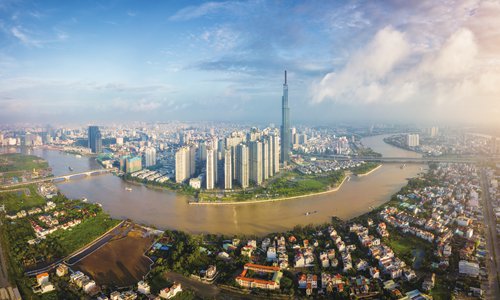Chinese companies in Ho Chi Minh City troubled by logistics disruptions, labor shortage

Ho Chi Minh City, Vietnam Photo: VCG
Logistical disruptions and labor shortages are troubling Chinese manufacturers in Ho Chi Minh City after the southern business hub in Vietnam eased COVID-19 lockdown measures, a local business association said.
As a significant link in the global supply chain, Vietnam faces a threat to its export-oriented economy from a lack of workers, affecting manufacturing for global brands such as Nike, Adidas and Apple.
Vietnam was one of the few economies to report positive growth in 2020, but growth contracted 6.17 percent year-on-year in the third quarter this year, the largest quarterly drop in 35 years.
Only 10 percent of Chinese plants in Ho Chi Minh City were capable of maintaining operations with more than 85 percent of total workers, Zhao Qian, head of the China Business Association Ho Chi Minh City Branch, told the Global Times on Tuesday. The city has a large number of factories manufacturing clothes, textiles and furniture.
“Companies manufacturing shoes and clothes are suffering from a serious backlog of orders. They are rushing to fulfil orders placed from July to September,” Zhao said, estimating that they would be unable to arrange new orders until February next year.
Meanwhile, companies in wood working, catering and services are suffering from a shortage of labor and a lack of raw materials, according to Zhao.
“Many workers have given up their jobs due to their worries about infection,” Zhao said.
Vietnam reported 3,168 new COVID-19 cases on Monday, according to the country's Ministry of Health. Most of the community cases were detected in southern localities, including 968 in Ho Chi Minh City, 439 in Binh Duong province, and 393 in Dong Nai province, the Xinhua News Agency reported.
Virus containment measures have also affected local logistics. “It would take more than a month for courier service companies to deliver the overstocked parcels even if they don’t take new orders,” Zhao noted.
Vietnam is an important supplier in the global industrial chain, so the production standstill caused by the epidemic will have an impact on the global economic recovery in the short term, especially on garment and electronics supplies, Xu Liping, director of the Center for Southeast Asian Studies at the Chinese Academy of Social Sciences in Beijing, told the Global Times on Tuesday.
Xu said if the coronavirus situation worsens in Vietnam, the global supply chains will definitely be relocated from Vietnam to other places.
“Some foreign companies have already relocated their factories in Vietnam to China,” Xu added, suggesting that if Vietnam can deal with the epidemic and labor issues, the foreign companies will still choose to build factories in the Southeast Asian country due to its lower labor costs.
The economic recovery of the key economic zones in southern Vietnam largely depends on Ho Chi Minh City, Hoang Cong Gia Khanh, vice chairman of the University of Economics and Law under Vietnam National University Ho Chi Minh City, told Vietnamese newspaper Nhan Dan, suggesting that the government should help companies reduce layoffs and re-recruit employees, as well as helping them to attract skilled workers who had returned to their villages during the quarantine period.
However, “the low vaccination rate and long-term quarantine polices have made society feel worn out. The decline in incomes has also caused weaker purchasing power, which may impact production,” Zhao said.

